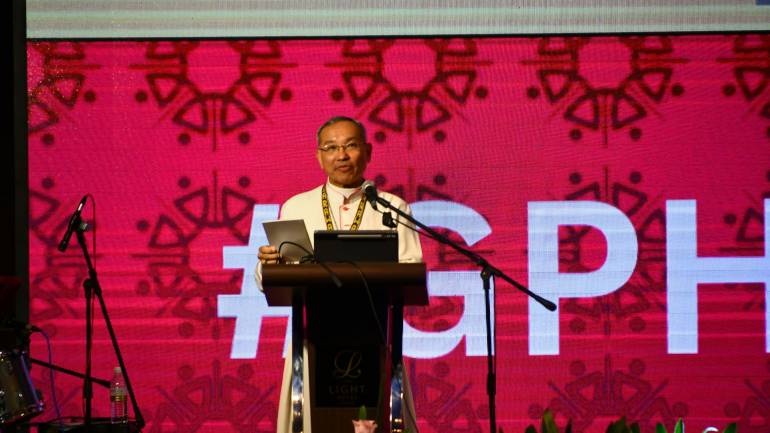Archbishop Poh: Walking Together Is Key — Not “Other Religions,” but “Neighboring Religions”

In a resounding support for dialogue and interreligious harmony, Archbishop Simon Poh of Kuching has called on the Church in Asia to walk together and to regard the various faith traditions of the continent not as “other religions” but as “neighboring religions.”
Archbishop Poh, who is also President of the Catholic Bishops’ Conference of Malaysia, delivered the keynote address on the second day (November 28) of the ongoing Great Pilgrimage of Hope 2025, held in Penang, Malaysia. Speaking on the theme “Journeying Together as Peoples of Asia,” he offered a wide-ranging reflection on Asia’s diversity, the vocation of the Church, and the path toward a synodal and hope-filled future.
Archbishop Poh began by grounding the assembly in communion and shared identity. “At this moment of God’s grace, we should be together as peoples of Asia,” he said, greeting bishops, priests, religious, deacons, and lay delegates. His reflections drew heavily from the Bangkok Document of the FABC’s 15th General Conference (2023), which he described as the Church’s roadmap for Asia today.
“Asia exists in Malaysia,” he said, noting how Chinese, Indian, Malay, indigenous communities, and various faith traditions live side by side. This diversity, also visible across Indonesia, Singapore, and Borneo, forms the everyday context in which Malaysian Christians witness and serve. “In my place,” he added, “we walk together in harmony.”
Journey of Discernment
The archbishop stressed that the Pilgrimage is a time for the Church to see, listen, and discern the signs of the times. Like the Magi from the East who searched for Christ, the peoples of Asia are called to read the signs, consult their communities, and follow the promptings of the Holy Spirit.
The Bangkok Document identifies major realities shaping Asia today: the lingering impact of the pandemic, digitalization, urbanization, migration, governance tensions, minority Church situations, youth challenges, gender concerns, cultural change, ecological crises, and religious pluralism. These challenges, he said, also bring new openings for service. “The Chinese character for ‘crisis’, danger plus opportunity, reminds us to look for opportunity.”
Using the classic YCS method See–Judge–Act, he urged participants to evaluate these realities through the lens of the Gospel and respond with creativity and courage: “We listen and discern what the Spirit is saying to the Churches in Asia.”
Dialogue
Archbishop Poh highlighted the three foundational dialogues emphasized by FABC since 1990: dialogue with religions, with cultures, and with the poor. Asia, as the birthplace of world religions and a region of vast cultural diversity and poverty, makes this triple dialogue a top priority for the Church.
Today, however, dialogue must expand to include youth, women, creation, migrants and refugees, technologists, victims of trafficking, persons with disabilities, and those struggling with mental health or addiction. Everyone must have a voice in the synodal journey.
Synodality
Archbishop Poh emphasized that synodality is not a technical term but a way of life deeply familiar to Asian cultures, an attitude of listening, shared responsibility, and unity in diversity.
At the intra level (within the Church): Synodality means bishops, priests, religious, and lay faithful discerning side by side, listening to the Holy Spirit speaking through one another.
At the extra level (outside the Church): Synodality extends outward, journeying with other Christians, collaborating with people of other religions, and caring for creation. In Asia’s multireligious setting, Archbishop Poh said, this is simply part of daily life. Walking together means building friendships, promoting peace and harmony, and responding to social and ecological challenges with shared responsibility.
Neighbors
One of the striking proposals from the FABC, he noted, is the use of the term “neighboring religions” instead of “non-Christians” or “other religions.” This shift reflects Asia’s lived experience of shared meals, friendships, festivals, and daily life. “This changes our mentality and behavior,” he said. “We treat one another as neighbors.”
Towards 2033
Looking ahead, he invited the Asian Church to prepare for 2033, the 2,000th anniversary of the Resurrection. “What gift will we offer the Lord?” he asked, calling the next seven years a time of renewal and journeying together.
Asia, he reminded the delegates, is “the land of the young,” with 60% of the world’s youth. Supporting families, strengthening education, forming leaders, and promoting youth participation are vital for the Church’s future.
In closing, he echoed the words of St. John Paul II: “You are the now of God.” “Young people,” he said, “are not only the future, they are the present, carrying within them the seeds of divine life for Asia.”










- Reply
Permalink